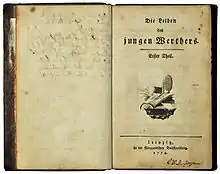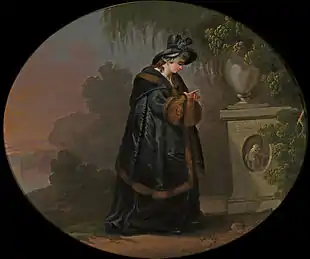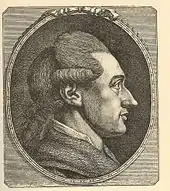The Sorrows of Young Werther
The Sorrows of Young Werther (German: Die Leiden des jungen Werthers) is a loosely autobiographical epistolary novel by Johann Wolfgang von Goethe. First published in 1774, it reappeared as a revised edition in 1787. It was one of the most important novels in the Sturm und Drang period in German literature, and influenced the later Romantic movement. Goethe, aged 24 at the time, finished Werther in five-and-a-half weeks of intensive writing in January–March 1774.[1] The book's publication instantly placed the author among the foremost international literary celebrities, and was among the best known of his works.[1][2]
 First print 1774 | |
| Author | Johann Wolfgang von Goethe[1] |
|---|---|
| Original title | Die Leiden des jungen Werthers[1] |
| Country | Germany |
| Language | German |
| Genre | Epistolary novel[1] |
| Publisher | Weygand'sche Buchhandlung, Leipzig |
Publication date | 29 September 1774, revised ed. 1787[2] |
Published in English | 1779[2] |
Plot summary

Most of The Sorrows of Young Werther, a story about unrequited love, is presented as a collection of letters written by Werther, a young artist of a sensitive and passionate temperament, to his friend Wilhelm. These give an intimate account of his stay in the fictional village of Wahlheim (based on Garbenheim, near Wetzlar),[3] whose peasants have enchanted him with their simple ways. There he meets Charlotte, a beautiful young girl who takes care of her siblings after the death of their mother. Werther falls in love with Charlotte despite knowing beforehand that she is engaged to a man named Albert, eleven years her senior.[4]
Despite the pain it causes him, Werther spends the next few months cultivating a close friendship with them both. His sorrow eventually becomes so unsupportable that he is forced to leave Wahlheim for Weimar, where he makes the acquaintance of Fräulein von B. He suffers great embarrassment when he forgetfully visits a friend and unexpectedly has to face there the weekly gathering of the entire aristocratic set. He is not tolerated and asked to leave since he is not a nobleman. He then returns to Wahlheim, where he suffers still more than before, partly because Charlotte and Albert are now married. Every day becomes a torturing reminder that Charlotte will never be able to requite his love. She, out of pity for her friend and respect for her husband, decides that Werther must not visit her so frequently. He visits her one final time, and they are both overcome with emotion after he recites to her a passage of his own translation of Ossian.
Even before that incident, Werther had hinted at the idea that one member of the love triangle – Charlotte, Albert or Werther himself – had to die to resolve the situation. Unable to hurt anyone else or seriously consider murder, Werther sees no other choice but to take his own life. After composing a farewell letter to be found after his death, he writes to Albert asking for his two pistols, on the pretext that he is going "on a journey". Charlotte receives the request with great emotion and sends the pistols. Werther then shoots himself in the head, but does not die until twelve hours later. He is buried between two lime trees that he had mentioned frequently in his letters. The funeral is not attended by any clergy, or by Albert or Charlotte. The book ends with an intimation that Charlotte may die of a broken heart: "I shall say nothing of...Charlotte's grief. ... Charlotte's life was despaired of."
Effect on Goethe

Werther was one of Goethe's few works aligned with the aesthetic, social and philosophical ideals that pervaded the German proto-Romantic movement known as Sturm und Drang, before he and Friedrich von Schiller moved into Weimar Classicism. The novel was published anonymously, and Goethe distanced himself from it in his later years,[2] regretting the fame it had brought him and the consequent attention to his own youthful love of Charlotte Buff, then already engaged to Johann Christian Kestner. Although he wrote Werther at the age of 24, it was all for which some of his visitors in his old age knew him. His views of literature had changed radically by then. He even denounced the Romantic movement as "everything that is sick."[5]
Goethe described the powerful impact the book had on him, writing that even if Werther had been a brother of his whom he had killed, he could not have been more haunted by his vengeful ghost. Yet, Goethe substantially reworked the book for the 1787 edition[2] and acknowledged the great personal and emotional influence that The Sorrows of Young Werther could exert on forlorn young lovers who discovered it. As he commented to his secretary in 1821, "It must be bad, if not everybody was to have a time in his life, when he felt as though Werther had been written exclusively for him." Even fifty years after the book's publication, Goethe wrote in a conversation with Johann Peter Eckermann about the emotional turmoil he had gone through while writing the book: "That was a creation which I, like the pelican, fed with the blood of my own heart."[6]
Cultural impact
The Sorrows of Young Werther turned Goethe, previously an unknown author, into a literary celebrity almost overnight. Napoleon Bonaparte considered it one of the great works of European literature, having written a Goethe-inspired soliloquy in his youth and carried Werther with him on his campaigning to Egypt. It also started the phenomenon known as the "Werther Fever", which caused young men throughout Europe to dress in the clothing style described for Werther in the novel.[7][8] Items of merchandising such as prints, decorated Meissen porcelain and even a perfume were produced.[9]
The book reputedly also led to some of the first known examples of copycat suicide. The men were often dressed in the same clothing "as Goethe's description of Werther and using similar pistols." Often the book was found at the scene of the suicide.[10] Rüdiger Safranski, a modern biographer of Goethe, dismisses the Werther Effect 'as only a persistent rumor'.[11] Nonetheless, this aspect of "Werther Fever" was watched with concern by the authorities – both the novel and the Werther clothing style were banned in Leipzig in 1775; the novel was also banned in Denmark and Italy.[9] It was also watched with fascination by fellow authors. One of these, Friedrich Nicolai, decided to create a satirical piece with a happy ending, entitled Die Freuden des jungen Werthers ("The Joys of Young Werther"), in which Albert, having realized what Werther is up to, loaded chicken's blood into the pistol, thereby foiling Werther's suicide, and happily concedes Charlotte to him. After some initial difficulties, Werther sheds his passionate youthful side and reintegrates himself into society as a respectable citizen.[12]
Goethe, however, was not pleased with the Freuden and started a literary war with Nicolai that lasted all his life, writing a poem titled "Nicolai auf Werthers Grabe" ("Nicolai on Werther's grave"), in which Nicolai (here a passing nameless pedestrian) defecates on Werther's grave,[13] so desecrating the memory of a Werther from which Goethe had distanced himself in the meantime, as he had from the Sturm und Drang. This argument was continued in his collection of short and critical poems, the Xenien, and his play Faust.
Alternative versions and appearances
- In Mary Shelley's Frankenstein, Frankenstein's monster finds the book in a leather portmanteau, along with two others – Plutarch's Lives of the Noble Greeks and Romans, and Milton's Paradise Lost. [14] He sees Werther's case as similar to his own, of one rejected by those he loved.
- The book influenced Ugo Foscolo's The Last Letters of Jacopo Ortis, which tells of a young man who commits suicide, out of desperation caused not only by love, but by the political situation of Italy before the Unification. This is taken to be the first Italian epistolary novel.
- Thomas Carlyle, who incidentally translated Goethe's novel Wilhelm Meister into English, frequently refers to and parodies Werther's relationship in his 1836 novel Sartor Resartus.[15]
- The statistician Karl Pearson's first book was The New Werther.
- Goethe's work was the basis for the 1892 opera Werther by Jules Massenet.
- William Makepeace Thackeray wrote a poem satirizing Goethe's story entitled Sorrows of Werther.
- Thomas Mann's 1939 novel Lotte in Weimar recounts a fictional reunion between Goethe and his youthful passion, Charlotte Buff.
- An episode of the Canadian television series History Bites features the book, with Bob Bainborough as Goethe.
- Ulrich Plenzdorf, a GDR poet, wrote a satirical novel (and play) called Die neuen Leiden des jungen W. ("The New Sorrows of Young W."), transposing the events into an East German setting, with the protagonist as an ineffectual teenager rebelling against the system.[16]
- In William Hill Brown's The Power of Sympathy, the novel appears next to Harrington's unsealed suicide note.
- The 2010 German film Goethe! is a fictional account of the relations between the young Goethe, Charlotte Buff and her fiancé Kestner, which at times draws on that of Werther, Charlotte and Albert.
- The 2014 novel The Sorrows of Young Mike by John Zelazny is a loosely autobiographical parody of Goethe's novel.[17]
- In the 2015 game, The Witcher 3: The Wild Hunt's Blood and Wine Expansion Pack, there is a treasure hunt called "The Suffering of Young Francois", where a man named François seeks help from a witch to make a woman named Charlotte, who is engaged with Albert, fall in love with him. The witch tricked François, making a Spriggan appear in the state and murder everyone. When François learns of this, he hangs himself.
- The story is read in the first episode of the 2019 series Rookie Historian Goo Hae-ryung.
Translations
- The Sorrows of Young Werther, Oxford World's Classics, tr. David Constantine, Oxford University Press, 2012, ISBN 978-0199583027CS1 maint: others (link).
- The Sorrows of Young Werther, Dover Thrift Editions, tr. Thomas Carlyle, R. Dillon Boylan, Dover Publications, 2002 [1902], ISBN 0-486-42455-3CS1 maint: others (link); originally publ. by CT Brainard.
- The Sufferings of Young Werther, tr. Harry Steinhauer, New York: WW Norton & Co, 1970, ISBN 0-393-09880-XCS1 maint: others (link).
- The Sorrows of Young Werther, & Novelle, Classics Edition, tr. Elizabeth Mayer, Louise Bogan; poems transl. & foreword W. H. Auden, Vintage Books, June 1990 [1971], ISBN 0-679-72951-8CS1 maint: others (link); originally publ. by Random House.
- The Sorrows of Young Werther, Classics Library Complete Collection, tr. Michael Hulse, Penguin Books, 1989, ISBN 0-14-044503-XCS1 maint: others (link).
- The Sorrows of Young Werther, Modern Library, tr.Burton Pike, Random House, 2004, ISBN 0-8129-6990-1CS1 maint: others (link).
- The Hebrew translation יסורי ורתר הצעיר was popular among youths in the Zionist pioneer communities in British Mandate of Palestine in the 1930s and 1940s and was blamed for the suicide of several young men considered to have emulated Werther.
See also
References
- Wellbery, David E; Ryan, Judith; Gumbrecht, Hans Ulrich (2004), A New History of German Literature, pp. 386–387, ISBN 978-0674015036
- Appelbaum, Stanley (2004-06-04), Introduction to The Sorrows of Young Werther, pp. vii–viii, ISBN 978-0486433639
- Goethe, Johann Wolfgang von; Applebaum, Stanley, trans. (2004). The Sorrows of Young Werther/Die Leiden des jungen Werther: A Dual-Language Book. Mineola, NY: Dover. p. N.p. ISBN 978-0486433639. Retrieved 7 February 2020.
- Robertson, JG, A History of German Literature, William Blackwood & Sons, p. 268
- Hunt, Lynn. The Makings of the West: Peoples and Cultures. Bedford/St. Martins Press
- Will Durant (1967). The Story of Civilization Volume 10: Rousseau and Revolution. Simon&Schuster. p. 563.
- Goleman, Daniel (March 18, 1987). "Pattern Of Death: Copycat Suicides Among Youths". The New York Times.
- A. Alvarez, The Savage God: A Story of Suicide (Norton, 1990), p. 228.
- Furedi, Frank (2015). "The Media's First Moral Panic". History Today. 65 (11).
- Devitt, Patrick. "13 Reasons Why and Suicide Contagion". Scientific American. Retrieved 2017-12-04.
- Ferdinand Mount (2017). "Super Goethe". The New York Review of Books. 64 (20).
- Friedrich Nicolai: Freuden des jungen Werthers. Leiden und Freuden Werthers des Mannes. Voran und zuletzt ein Gespräch. Klett, Stuttgart 1980, ISBN 3-12-353600-9
- Johann Wolfgang von Goethe, David Luke (1964), Goethe: with plain prose translations of each poem (in German), ISBN 978-0140420746, retrieved 1 December 2010
- Wollstonecraft (Godwin) Shelley, Mary. Frankenstein or The Modern Prometheus (Chapter 15).
- Shapiro, Alexander H. (2019). The Consolations of History: Themes of Progress and Potential in Richard Wagner's Gotterdammerung. London: Routledge. p. N.p. ISBN 978-0367243210. Retrieved 7 February 2020.
- Ulrich Plensdorf, tr. Romy Fursland: The New Sorrows of Young W. (London: Pushkin Press, 2015).
- Andrew Travers, "In Aspenite's debut novel, a Goethe hero lost at sea," The Aspen Times, October 3, 2014.
- Auden, Wystan Hugh (1971), Foreword, Toronto, Ontario, Canada: Random House, Inc.
- Herold, J. Christopher (1963). The Age of Napoleon. American Heritage Inc.
- Wilkinson, William Cleaver (1887), Classic German Course in English, Chautauqua Press, retrieved 2007-03-16
External links
| Wikimedia Commons has media related to Die Leiden des jungen Werthers. |
| Wikiquote has quotations related to: The Sorrows of Young Werther |
| Wikisource has original text related to this article: |
| Wikisource has original works on the topic: The Sorrows of Young Werther |
- The Sorrows of Young Werther at Project Gutenberg
- Free Audiobook from LibriVox (in German)
- The Sorrows of Young Werther Free Audio in English
- What Werther Went Through (21st-century update, published in "real-time" online and via personalised emails)
- William Makepeace Thackeray's poem "Sorrows of Werther"
.jpg.webp)